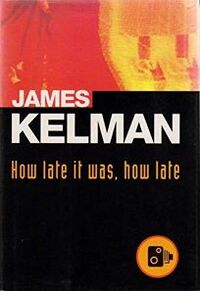Take a photo of a barcode or cover
James Kelman's Booker Prize winning How Late It Was, How Late is an excellent example of stream-of-consciousness. Kelman really takes us inside the head of our newly-blind protagonist - the disorientation, helplessness and paranoia are conveyed masterfully. This is one of those books that I wished I enjoyed more, but I just didn't. I wasn't that big a fan of the structure and found the ending unsatisfying. I'm probably being unfair on poor Kelman, because I had just got done reading Lanark, also set in Glasgow & written with lots of Scottish slang, and it's a tall order to measure up to Lanark.
dark
funny
tense
medium-paced
Plot or Character Driven:
Character
Strong character development:
Yes
Loveable characters:
Yes
Diverse cast of characters:
Complicated
Flaws of characters a main focus:
Yes
lighthearted
mysterious
slow-paced
dark
emotional
funny
sad
medium-paced
Plot or Character Driven:
Character
Strong character development:
Complicated
Loveable characters:
Yes
Diverse cast of characters:
No
Flaws of characters a main focus:
Yes
I thought I would really hate it but somehow I don't really do. But I'm not a fan of it either and did not really enjoy reading it. Partly because some passages tended to make me frustrated about all the characters being so damn annoying. At the same time I was not as much bothered by the writing style as I had feared and there was an actual flow while following the stream of consciousness.
even had there not been so many f-bombs (sometimes as many as three in a line!), i still would have found myself at a loss to care much for the protagonist. hard to follow, repetitive, dull.
challenging
dark
funny
tense
slow-paced
Plot or Character Driven:
Character
Strong character development:
No
Loveable characters:
No
Diverse cast of characters:
No
Flaws of characters a main focus:
Yes
Loved the language but confused by the ending
Conflicted. I should like this book - a Booker prize-winning novel set in my home city of Glasgow and written in the Glaswegian dialect. I really wanted to like this book.
But the curse of Booker struck again (see also Milkman by Anna Burns). It's a tough slog to read, with deliberately disconcerting sentences and paragraphs left unfinished. It starts with an interesting premise but then the plot goes absolutely nowhere. The pace crawls along, pages and pages endlessly repeating, conversations that go in circles and end up nowhere.
The dialect is good to read, the swearing is true to life, but there are little niggles - having lived in Glasgow my whole life, I have never heard anyone refer to police officers as 'soldiers'.
And then there's Sammy, the main character. The trouble with people like Sammy, working class, down on his luck, ex-con, is that artists and authors romanticize them into something they're not. In truth, this sort of character can be found in Glasgow, and generally they are not very nice people. So it's hard to have any empathy.
And by the end, it all seems a bit pointless and not worth the effort - and then I read the quotes on the covers lauding it and remember it won the Booker and I think I really must be missing something.
But the curse of Booker struck again (see also Milkman by Anna Burns). It's a tough slog to read, with deliberately disconcerting sentences and paragraphs left unfinished. It starts with an interesting premise but then the plot goes absolutely nowhere. The pace crawls along, pages and pages endlessly repeating, conversations that go in circles and end up nowhere.
The dialect is good to read, the swearing is true to life, but there are little niggles - having lived in Glasgow my whole life, I have never heard anyone refer to police officers as 'soldiers'.
And then there's Sammy, the main character. The trouble with people like Sammy, working class, down on his luck, ex-con, is that artists and authors romanticize them into something they're not. In truth, this sort of character can be found in Glasgow, and generally they are not very nice people. So it's hard to have any empathy.
And by the end, it all seems a bit pointless and not worth the effort - and then I read the quotes on the covers lauding it and remember it won the Booker and I think I really must be missing something.



